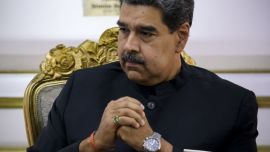International Monetary Fund staff are working closely with officials in Argentina to secure an agreement on a new financing deal "as quickly as possible," a spokesman for the multilateral lender said Thursday.
President Alberto Fernández's government in late January announced it had reached an "understanding" with the International Monetary Fund on key policies needed for a deal on its existing US$44.5-billion debt with the crisis lender.
In recent weeks, the government has paid just over US$1 billion in principle and interest on the loan, but is seeking to restructure the remaining payments, which were due this year and next.
"Discussions are ongoing, fairly intensively," but there is no timeline for reaching an agreement, IMF spokesman Gerry Rice told reporters Thursday. "We will be looking to do this as quickly as possible, so stay tuned for updates."
The government is working to fine-tune the technical and legal documents necessary to reach a staff-level agreement before March, according to government officials who asked not to be named.
Former president Mauricio Macri in 2018 originally agreed to a US$57-billion loan, the IMF's biggest-ever credit-line, but which the lender recently acknowledged had failed to achieve the objectives of restoring confidence in the country's fiscal viability and fostering economic growth.
President Fernández refused to accept the final disbursements of US$13 billion upon taking office in December 2019.
Rice said the IMF staff team "continues working very closely with the authorities" on a deal, which would require final approval from the Fund's board.
He said there was no date set for the visit of an IMF mission team to Argentina. Nor would he answer whether the IMF would agree to postpone an upcoming debt maturity of about US$2.9 billion, due in March, if a new agreement was not approved by then.
The focus is on "a realistic, pragmatic, credible approach to designing a programme with Argentina that will strengthen the country's macroeconomic stability and begin to address the deep-seated challenges facing the country," Rice said.
Under the new deal, Argentina has committed to progressively reducing its fiscal deficit from three percent of GDP in 2021 to 0.9 percent in 2024. The gradual reduction – to 2.5 percent in 2022 and 1.9 percent in 2023 – would "not prevent the recovery" of the economy, according to Economy Minister Martín Guzmán.
Last week, IMF managing director Kristalina Georgieva called for a focus on finalising the terms of the agreement and implementing it, saying there is "no alternative."
"Our main focus is to get Argentina off this very dangerous path of high inflation," she told reporters.
– TIMES/AFP






















Comments